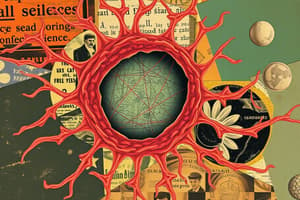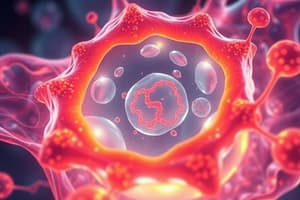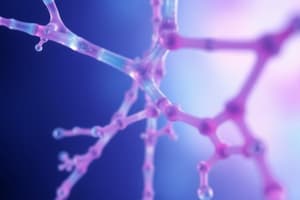Podcast
Questions and Answers
What is the primary function of the nucleolus?
What is the primary function of the nucleolus?
- Powerhouse of the cell
- Packages proteins into vesicles
- Stores materials to make ribosomes (correct)
- Site of protein synthesis
Which structure is known as the 'powerhouse of the cell'?
Which structure is known as the 'powerhouse of the cell'?
- Lysosome
- Golgi apparatus
- Mitochondria (correct)
- Endoplasmic reticulum
What is the role of the Golgi apparatus in a cell?
What is the role of the Golgi apparatus in a cell?
- Site of photosynthesis
- Packages proteins into vesicles (correct)
- Production of proteins
- Digestion of macromolecules
Which organelle is primarily responsible for breaking down waste within the cell?
Which organelle is primarily responsible for breaking down waste within the cell?
What distinguishes eukaryotic cells from prokaryotic cells?
What distinguishes eukaryotic cells from prokaryotic cells?
What do chloroplasts do in plant cells?
What do chloroplasts do in plant cells?
Which of the following is NOT a characteristic of prokaryotic cells?
Which of the following is NOT a characteristic of prokaryotic cells?
What role does the nucleus play in a eukaryotic cell?
What role does the nucleus play in a eukaryotic cell?
Which component of the cytoskeleton is primarily involved in cell shape and support?
Which component of the cytoskeleton is primarily involved in cell shape and support?
What is the primary function of a vacuole in cells?
What is the primary function of a vacuole in cells?
Which statement correctly describes DNA?
Which statement correctly describes DNA?
What is the function of the cell membrane?
What is the function of the cell membrane?
What is the role of centrosomes during cell division?
What is the role of centrosomes during cell division?
Which of the following statements about cytoplasm is true?
Which of the following statements about cytoplasm is true?
Which structure provides support and strength exclusively to plant cells?
Which structure provides support and strength exclusively to plant cells?
What type of DNA organization is typically found in eukaryotic cells?
What type of DNA organization is typically found in eukaryotic cells?
What term describes organisms consisting of a single cell?
What term describes organisms consisting of a single cell?
Who was responsible for the first observation of living cells?
Who was responsible for the first observation of living cells?
What is one of the key principles of cell theory?
What is one of the key principles of cell theory?
What instrument is essential for observing cells that cannot be seen with the naked eye?
What instrument is essential for observing cells that cannot be seen with the naked eye?
Which scientist is associated with the observation of cell division?
Which scientist is associated with the observation of cell division?
Which of the following correctly defines a tissue?
Which of the following correctly defines a tissue?
What significance does Robert Hooke’s discovery of cells hold?
What significance does Robert Hooke’s discovery of cells hold?
What hierarchy of life progresses from cells to living organisms?
What hierarchy of life progresses from cells to living organisms?
Flashcards are hidden until you start studying
Study Notes
Cell Theory and Structures
- Cells are the smallest and basic unit of all living things.
- The term "cell" originates from "cella," meaning small room.
- Unicellular organisms consist of a single cell; multicellular organisms contain multiple cells.
Discovery of Cells
- Robert Hooke discovered cells in 1665, leading to the foundation of cell theory.
- Anton van Leeuwenhoek observed the first living cells in 1673 using single-lens microscopes.
Cell Theory Principles
- All organisms are made up of one or more cells.
- Cells serve as the basic unit of structure and function in living things.
- All cells arise from pre-existing cells.
- Key contributors to cell theory: Matthias Schleiden (plants), Theodor Schwann (animals), and Rudolf Virchow (cell division).
Hierarchy of Life
- Organism hierarchy: Cell → Tissue → Organ → System → Organism.
Types of Cells
- Prokaryotic Cells: No nucleus, no membrane-bound organelles, simpler DNA structure (circular) typically found in bacteria.
- Eukaryotic Cells: Have a nucleus, membrane-bound organelles, complex DNA structure (linear) found in animals, plants, fungi, and protists.
Nucleus and DNA
- The nucleus is the control center of the cell, housing chromosomes that contain DNA.
- DNA is vital for storing information and instructions for protein synthesis.
Cell Parts and Functions
- Cytoplasm: Jelly-like fluid inside the cell, housing organelles.
- Cell Membrane: Protects the cell, keeps cytoplasm contained, and controls material exchange.
- Cell Wall: Provides structural support in plant cells, preventing over-expansion.
- Nucleus: Contains DNA and acts as the information processing center.
- Nucleolus: Produces ribosomes within the nucleus.
- Ribosomes: Sites of protein synthesis, found free in the cytoplasm or on the endoplasmic reticulum.
- Endoplasmic Reticulum (ER): Can be smooth or rough; produces proteins for cell functions.
- Mitochondria: The powerhouse of the cell, generating energy (ATP) through nutrient oxidation.
- Chloroplasts: Organelles in plant cells that convert light energy into chemical energy; the site of photosynthesis.
- Golgi Apparatus: Packages proteins into vesicles for transport within the cell.
- Lysosomes: Digestive organelles that eliminate waste and protect against invaders; found in animal cells.
- Vacuole: Fluid-filled sac for material storage; often large in plant cells.
- Cytoskeleton: A network of protein fibers providing cell shape, support, and facilitating movement.
- Centrosome: Organizes microtubules and structures during cell division.
- Amyloplasts: Organelles in plant cells for starch synthesis and storage.
Studying That Suits You
Use AI to generate personalized quizzes and flashcards to suit your learning preferences.




